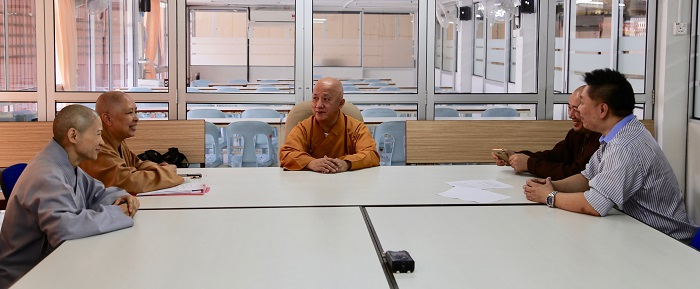Translated By Andrew Yang
In November 2019, Venerable Guan Cheng, abbot of the International Buddhist Temple, toured Malaysia to promote the Dharma. Venerable Shan Ci was on the team accompanying him, and to exchange ideas and learn from fellow Buddhists and Buddhist organizations, she spoke with Malaysian Buddhist Association on November 5, 2019 about the history and growth of Buddhism in the nation. Participating in the candid interview were Venerable Ch’an Liang, Acting President, Venerable Ching Chieh, Director of Youth Affairs, and Mr Li Chen Shuang, Deputy Director of General Affairs of the Association.
Malaysia appoints Islam as its official religion. According to its constitution, all Malays, who are the country’s majority ethnic group, are Muslim, accounting for 70% of the national population. Among the ethnic minorities, Chinese make up 20%, and Indians close to 10%. In general, Malaysian Chinese are Buddhists, Christians or folk Chinese religion believers. According to the 2010 Census, 5,620,483 people or nearly 20% of the Malaysian population considered themselves Buddhists, except for those who were Christians. In addition to Malaysian Buddhist Association, there are also the Buddhist Missionary Society Malaysia, Sasana Abhiwurdhi Wardhana Society, Young Buddhist Association of Malaysia, Vajrayana Buddhist Council of Malaysia, Theravada Buddhist Council of Malaysia and a few other national Buddhist organizations.
The following is a summary of this interview.

Venerable Ch’an Liang, Acting President of Malaysian Buddhist Association
Question: How was your organization set up and what is its mission?
Answer: Malaysian Buddhist Association started preparations two years before Independence. It was registered with the government shortly after Independence in 1957 and became Malaysia’s first national Buddhist organization. Two years later, Prime Minister Tunku Abdul Rahman visited Kek Lok Si Temple in Penang and attended our opening ceremony. Currently we have 34 chapters, 1,095 group members and nearly 30,000 individual members.
Malaysia is an Islamic country with diverse religions and ethnic groups. Our association has been working under the leadership of our founding president Venerable Chuk Mor, past presidents Venerable Kim Beng and Venerable Jik Huang, our current president Venerable Jit Heng and Venerable Chih K’un Bhikkhu at Kek Lok Si temple. Our mission is to help promote racial harmony and national stability through disseminating Buddhism, protecting the Dharma, uniting Buddhist organizations and working in harmony with all other religions.
In terms of descent, the majority of Malaysian Buddhists follow the Chinese Han Mahayana tradition, but Malaysian Buddhist Association has been actively involved in working with the two other major practices of Buddhism, Southeast Asian Theravada and Tibetan Buddhism.
Question: How does your association root out fake or otherwise problematic Buddhist groups?
Answer: In assessing group membership applications, we make a point of visiting the applicants, carefully examine their operations and make sure they are not involved in any activity in breach of the Buddhist belief. In cases where we do suspect unauthentic, faux organizations engaging in fraudulent behaviour in the name of Buddhism, we communicate with the government, publicise alerts through media and the Internet to educate and warn followers as well as the general public. We strive to become a good liaison between the government and public, and have served as an effective communications platform to minimize misunderstandings about Buddhism.
Question: Your country has Islam as its official religion. How then does Buddhism survive and evolve under this state policy?
Answer: It’s true Islam is Malaysia’s state religion, but at the same time its constitution guarantees freedom for the ethnic minorities to follow other faiths. Aside from Islam, Malaysia has five prominent religions: Buddhism, Christianity, Hinduism, Sikhism, and Taoism. The government is open-minded towards all the different religions. And in order to strengthen national unity and stability, it has established a federal-level interreligious coordinating council. And also, in each state there is a bureau that regulates non-Islamic affairs, where representatives from Buddhist and the various other religions meet regularly to discuss and consult each other on specific religious policy issues, such as evaluating organizations, approving land use, and holding national multi-faith prayer ceremony.
In this way, the government is both cautious and open-minded in handling issues to do with religion and race. Coupled with the efforts by organizations of all religions to communicate with and respect each other, for decades, there has been no large-scale incident against Buddhism in Malaysia.

